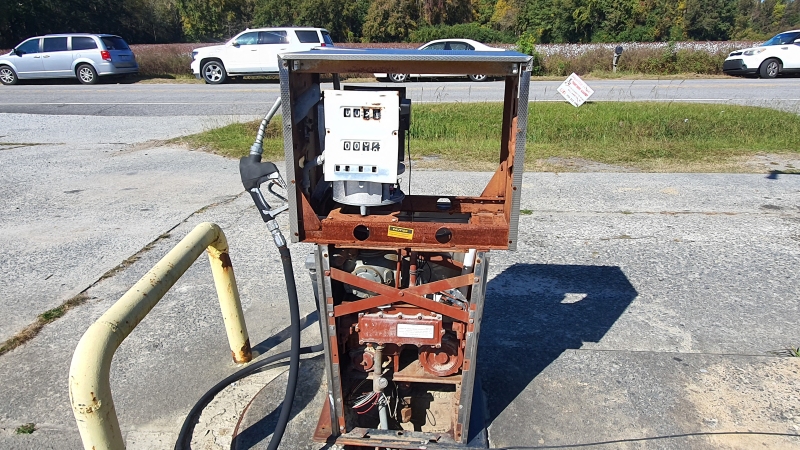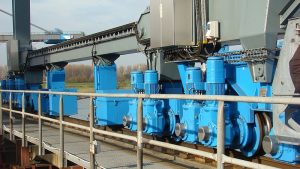What is this article about?
Purchasing used industrial machinery tends to involve a higher risk than purchasing new machinery. The initial price advantage can quickly turn into a significant disadvantage, especially if technical errors are identified and especially if the requirements of the industrial safety regulations are not met. In such cases, necessary modifications are often not justifiable from an economic perspective. This highlights the need for thorough inspection before purchasing used industrial machinery.
In this article I look at some important points about purchasing used machines, which often lead to problems in practice. In particular, the industrial safety regulations, which are almost always underestimated, “cause” problems. How can you reduce risks? You will find out in the article.
Why are used machines bought?
Purchasing a used industrial machine can offer a number of benefits, especially for companies looking for cost-effective and reliable solutions. Some of the most important aspects are listed.
Cost development for machines in Germany based on January 2020 (100%)
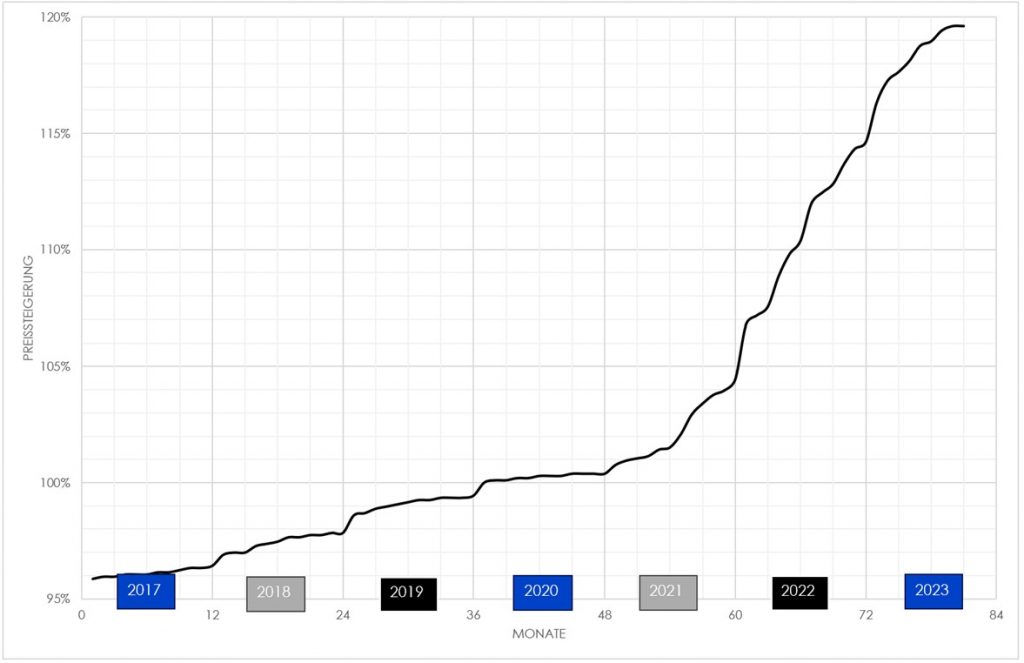
Producer price index for machines in Germany; Source: Federal Statistical Office (Destatis), 2023 | As of: October 25, 2023.
Since the emergence of the Covid-19 pandemic in 2020, there has been a notable and continuous increase in producer prices for machinery. This obvious trend can be attributed to well-known factors, including the ongoing shortage of materials, the associated increased purchasing costs, the alarmingly increased energy costs and the high personnel costs in Germany.
The data from the Federal Statistical Office as of September 2023 clearly shows a drastic increase of around 20% compared to the beginning of 2020, the start of the pandemic. In contrast, in the previous identical period from 2017 to the start of the pandemic in 2020, there was only a marginal price difference of just under 4%.
Unfortunately, current developments indicate that there is no immediate end to these price increases, which significantly clouds the economic outlook for companies operating on tight budgets and those also suffering from the effects of these cost increases. Given these circumstances, the decision to invest in used industrial machinery becomes increasingly relevant. However, these investments come with their own challenges and risks, especially if the industrial machine is purchased second-hand
- unexpectedly fails,
- the delivery has defects,
- simply turns out to be an inferior product or as
- used industrial machine no longer complies with legal requirements.
Advantages of a used machine
The main advantages of buying a used machine are:
- Cost Savings : Used industrial machinery is typically less expensive than new machinery, allowing companies to reduce expenses and free up capital for other business needs as a first step.
- Immediate availability : Unlike new machines, which can often have longer delivery times, used machines are usually available immediately. This can be particularly beneficial if a company needs an additional machine quickly to increase production capacity.
- Proven Performance : Often used industrial machines have a proven track record of performance and reliability. By evaluating the history and past performance, buyers can ensure that the machine is suitable for their needs with careful inspection.
- Reduced risk when testing new processes : By purchasing used machinery, companies can test new processes and technologies at a lower risk.
Despite these advantages, potential buyers should
check carefully,
whether the used machine meets the specific requirements and quality standards as well as the
A thorough inspection, review of maintenance history and agreed warranties can help minimize potential risks related to technical criteria and ensure that the investment is profitable.
It is also advisable to seek professional advice, especially when it comes to expensive investments, to ensure that the chosen option meets individual needs and goals. What is essential is:
A thorough analysis and weighing of the individual advantages and disadvantages is crucial in order to make the right decision.
Technical risks when purchasing used industrial machines
The decision to purchase used industrial machinery involves a variety of technical risks for buyers that must be carefully evaluated. Key aspects that need to be taken into account include the general machine condition and the guarantee of functionality, compatibility and integration into existing operational processes, the detailed maintenance and repair history, as well as compliance with CE conformity standards and the industrial safety regulations. A comprehensive understanding of these technical risks is crucial to anticipate potential complications and take preventive measures to minimize risks.
Technical machine condition and functionality of the used machine
Purchasing used industrial machinery without first thoroughly inspecting it is a risky undertaking that leads to potential technical and legal problems. It is not uncommon for the unpleasant situation to arise where, after purchase and delivery, it is discovered that the used machine delivered has significant defects.
You are currently viewing a placeholder content from Youtube. To access the actual content, click the button below. Please note that doing so will share data with third-party providers.
More InformationAfter buying a used machine: Significant tolerance deviations.
Wear and tear
The example in the video shows a “classic situation” on an old, used industrial machine.
You can see from the video that there are significant deviations in the concentricity, depending on the measuring location. If there are high requirements for accuracy, as in the case of the example, there is a technical problem at this point due to the deviation. If the error or defective delivery is only discovered after the machine has been purchased and delivered, the buyer will not be able to get rid of the machine quickly.
A scenario like this example usually results in a conflict between the buyer, the subsequent operator, and the supplier. Legal disputes are often inevitable.
Technologically outdated
Another serious problem arises when the machine purchased is technologically outdated. This affects both the actual machine technology and safety-relevant aspects, especially with regard to the industrial safety regulations (BetrSichV) that the operator must comply with. This legal requirement is often simply “forgotten” by the buyer/operator when purchasing a used machine.
Compatibility and integration
The used industrial machine must necessarily be compatible with the buyer’s existing operating processes and systems. The lack of this compatibility can cause significant problems between the parties involved after the purchase. A thorough technical inspection by competent experts
before conclusion of the contract
can be invaluable here.
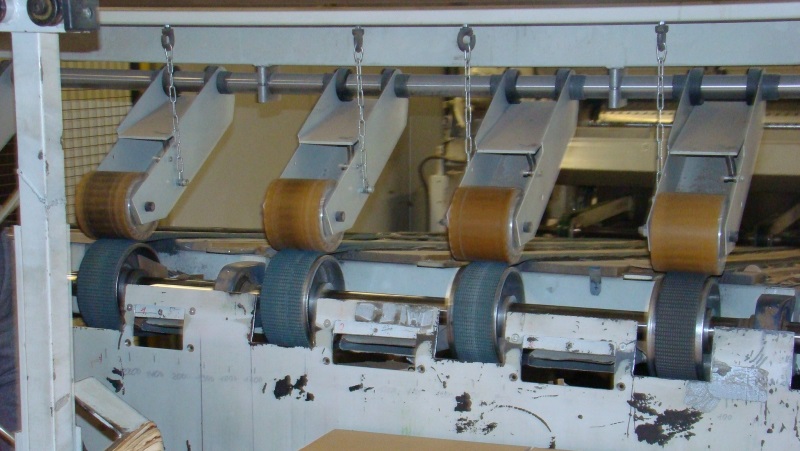
Old, used machine: Is there a defective delivery?
Interfaces and control systems
Another significant problem in practice concerns the topic of “control systems”. If the existing control becomes obsolete or no longer works, the associated costs can be significant. In the worst case, suitable controls (old design) are no longer available on the market. The question then quickly arises as to whether
technical adaptation is still economically justifiable.
However, if the machine has already been purchased, this will almost inevitably lead to legal disputes between the parties.
Maintenance and repair history
As a machine ages, maintenance costs generally increase.
Maintenance costs, maintenance costs of used industrial machines
Older machines often have the disadvantage that the effort required for maintenance and the associated costs are higher than with new machines. In addition, the history of the machine is often unknown, which represents a significant risk for the buyer and subsequent operator if this is not checked in detail before purchase.
Availability of spare parts
Another acute problem in practice is the limited availability of spare parts. Many machine manufacturers keep spare parts on hand for a maximum of ten years. After that, a challenge often begins for operators of older machines. This can lead to increased costs or to the used machine having to be converted in some way in order to continue to operate. This raises further questions, for example with regard to the applicable Machinery Directive and the necessary examination and assessment of a “significant change”. All these problems can be minimized if
A thorough inspection is carried out before purchasing the machine,
for example by competent experts in order to reduce the risk to a minimum.
Conversion of old machines
Things become particularly tricky when, after delivery, it is discovered that the purchased used industrial machine, also known as an old machine, has been converted or modified in some way. In such cases the question inevitably arises as to
whether the hopefully existing CE marking is still valid.
This scenario can lead to further legal ambiguity and requires careful consideration of compliance and security standards. If things go badly, the machine may not be operated at all (initially). Going through the necessary conformity procedure can result in considerable follow-up costs.
Some requirements when purchasing used industrial machinery
Operating machines in the European Economic Area (EEA) requires compliance with a variety of guidelines and requirements. Unfortunately, this important compliance is often completely neglected by buyers, usually the future operators, when purchasing seemingly cheap machines. This can lead to the seemingly inexpensive used machine becoming an economic fiasco. In the worst case, use is not permitted, or the
Meeting the necessary requirements results in significant economic losses.
These risks illustrate the essential importance of comprehensive knowledge of the legal regulations as well as a careful technical examination of the used machine in order to avoid potential economic and legal consequences.
Purchase of used industrial machinery built from 1995 onwards within the EEA
The procurement of used industrial machinery within the European Economic Area (EEA) is a complex process that is regulated by a number of legal regulations and guidelines. Particularly since 1995, the application of the Product Safety Act in conjunction with the Product Safety Ordinance and the Machinery Directive has had a significant impact on the purchase of machines manufactured during this period. These regulations ensure that used machines manufactured from 1995 onwards and traded within the EEA (should) meet the high safety and quality standards of European legislation. Compliance with these regulations not only serves to protect people and property, but also to ensure the smooth and safe operation of industrial machinery in the EEA.
In principle, all machines from 1995 in the EEA must, among other things, have the marking of conformity (CE mark) and a declaration of conformity. Only,
does this still apply?
This is an important question that determines continued operation and follow-up costs after purchasing a used industrial machine.
Procurement of older used machines built before 1995 within the EEA
For older used machines built before 1995, only the respective national construction and equipment standards applied in the various member states of the European Economic Area. Although a common European Machinery Directive to create an internal market for machines existed from 1989, it was only implemented into national law at the end of 1992 and was only binding for machine manufacturers in Germany from 1995.
Determining the specific previous national requirements of the various EEA states for older used machines involves considerable effort. Furthermore, these national regulations do not serve as a benchmark for the permissible current provision of older used machines in Germany.
While the requirements of the Product Safety Act apply to newer used machines, they do not apply to older used machines. Nevertheless, the Product Safety Act allows older machines to be made available on the market that do not fall under the Machinery Ordinance, provided that they are
When used as intended or foreseeable, the safety and health of people are not endangered.
According to the Product Safety Act, it is clearly emphasized that the possibility of achieving a higher safety standard (for example through potential conversion measures on a used machine) or the availability of other machines that pose a lower risk are not sufficient to classify a product as dangerous.
In addition to the basic requirements of the Product Safety Act, buyers and potential future buyers must
Operators also observe the provisions of the industrial safety regulations. These regulations apply to all new machines and to all used machines, regardless of year of manufacture.
Used machines from non-EEA countries
The purchase of used machines that do not come from member states of the European Economic Area (EEA) entails significantly more extensive requirements and consequences in terms of safety and formal standards. Regardless of year of construction, machine type and country of origin, such used machines may only be made available on the European market if they meet all the requirements of the relevant European internal market directives, such as the Machinery Directive, the Low Voltage Directive or the Pressure Equipment Directive. This means that all used machines, regardless of their origin, must, among other things, have a declaration of conformity in accordance with the provisions of the Machinery Directive.
Consequently, used machines from non-EEA countries should be treated in the same way as new machines from these countries when it comes to procurement. The different requirements for used machines depending on their country of origin and year of manufacture can present significant obstacles for buyers before they can use the machines in their operations. In view of this, it is advisable to specify the essential requirements for the used machine in the purchase contract in order to avoid misunderstandings and potential legal problems.
General requirements for used machines
The Industrial Safety Regulation places the responsibility on the operator, often the buyer, of a machine to ensure that the requirements of the regulation are met when using a purchased used machine. This is particularly true when purchasing an older used machine
before the purchase.
council, the
Carefully check that the machine to be purchased complies with the provisions of the Industrial Safety Ordinance.
Otherwise, it is the buyer’s responsibility to independently ensure the required conformity.
As part of the Industrial Safety Ordinance, the machine operator is obliged to determine the necessary protective measures for the safe use of the machine, in this case the used machine, on the basis of a comprehensive risk assessment. It is crucial that the protective measures and use of the machine are appropriate
the current state of the art
be implemented. This means that the operator is obliged to
to take into account all available technical and safety measures in order to minimize potential risks and dangers in the workplace and to ensure the safety of workers.
Compliance with these regulations is essential to avoid accidents, health risks and potential legal consequences that could result from a breach of the provisions of the Industrial Safety Regulations.
Used industrial machine: Defective delivery – examples
Some exemplary examples are listed in the subsections.
CE marking and declaration of conformity
The CE marking documents the unilateral declaration by the manufacturer or importer that he is convinced that the usable product, e.g. B. machine, all safety requirements from the EC directives relevant to the product are met at the time it is first placed on the market.
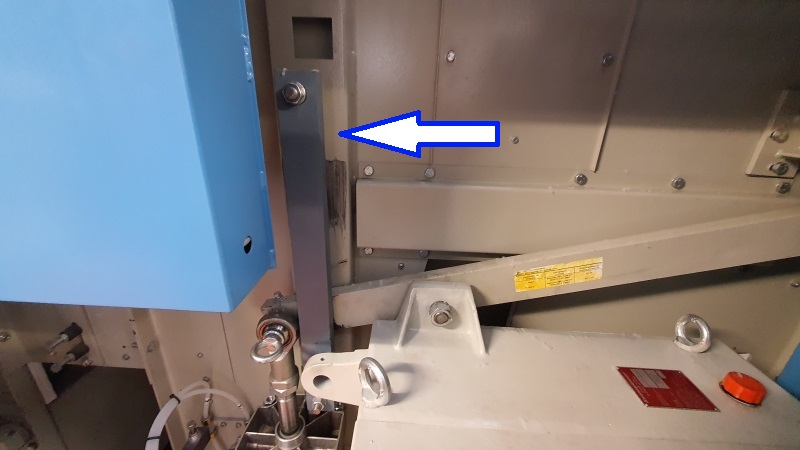
“Modified” Received used machine. What does that mean?
The picture shows a subsequently taken into account “guide” of a roller on a used machine. It documents that the original manufacturer of the machine has intervened in the design since it was first placed on the market. Why was this done? Has the “ Material Change ” been reviewed?
Is the declaration of conformity still valid?
This is the important question that the operator has to clarify if the purchase has already been completed and has not been checked beforehand.
Missing declaration of conformity
A common case is the lack of a declaration of conformity. It is essential to ensure that the used machine delivered complies (at least) with the information in the declaration of conformity even after purchase. A lack of clarity on this matter can lead to significant legal problems for the operator in the event of personal injury.
Bought a modified used machine with CE?
If a used machine has a declaration of conformity and a CE marking from the time it was placed on the market, but has undergone obvious changes since then, see image, specific steps must be taken to ensure legal compliance. Some measures are:
- Compliance Review : The first step is to conduct a thorough review to determine whether the changes made have affected compliance with the original standards and regulations.
2. Risk assessment : A comprehensive risk assessment should be carried out to identify potential impacts on the safety and operation of the machine.
This costs operators a lot of effort and therefore time and money. Don’t forget the risk it entails.
Operating instructions
Machines purchased used often do not come with operating instructions in other languages or that do not correspond to the machine type.
This is also problematic for buyers/operators.
Changes that affect security
If the dimensions of the used machine are not 1:1 compatible with the buyer/operator’s location, I have experienced several times that the supplier then makes technical changes to the used machine to the detriment of safety, so that it “fits” the installation location.
Something like that is not permitted either.
Changes that affect security
Old machines often have problems with accuracy. The video shows an example that I have had numerous times in similar form in litigation.
If it cannot be manufactured precisely, a permanent and recurring problem is created for the operator when purchasing the used machine.
You can take this risk
can be significantly minimized if experts check in detail before purchasing.
Control problems
I keep seeing technical problems with controls. Machines then do not do what the control actually “indicates” and should specify.
Old machines often no longer have the original controls. The “new-old” adjustment either doesn’t work, is very expensive, or results in other technical problems.
All of this is extremely unpleasant for operators and costs money.
Industrial Safety Ordinance 2015: Often a killer for used machines
The Industrial Safety Ordinance (BetrSichV) defines specific requirements for safety and health protection when providing and using work equipment and systems requiring monitoring. It came into force in Germany on June 1, 2015 and serves to implement the European Work Equipment Directive 2009/104/EC.
The Industrial Safety Ordinance sets out obligations for employers, including machine operators, to ensure the safety and health of their employees.
The work equipment includes
- Machinery,
- Devices,
- apparatus,
- systems and their
- Parts and accessories.
The regulation deals with aspects such as risk assessment, the safe provision of work equipment, maintenance and testing, monitoring of work equipment and the documentation of measures to ensure safety.
The Industrial Safety Ordinance aims to minimize occupational accidents and health risks in the workplace and thus protect the safety and health of employees.
Why is it often the “KO” for old machines?
The operator is obliged to protect its employees. In the Federal Republic of Germany, European regulations have been implemented, for example via the Industrial Safety Ordinance 2015 . Here too, the member states had to implement European law into national law.
Old machines often have a lower level of safety technology than is required for new machines in the current version of the Machinery Directive. Retrofitting to the current state of the Machinery Directive is common
- technically not possible and/or
- economically not feasible.
The BetrSV2015 requires that the employer may only provide machines whose…
Safe to use according to the state of the art
according to BetrSichV2015, §5 paragraph 3 in conjunction with §3. This requirement also applies to old machines.
Therefore it also exists
no grandfathering regulation ,
but it must
always on a case-by-case basis
assess whether a machine is safe to use.
Due to the fact that the state of the art must be achieved when the operator also makes used (old) machines available to the employees, this means very often
the economic end for used machines.
Risk minimization measures when purchasing used industrial machines
When purchasing used industrial machinery, risk minimization measures are of central importance, especially before purchase. However, if there is an inadequate delivery of a used machine or poor performance, often referred to as poor performance, appropriate steps can be taken by experienced, professional experts even after the purchase. Given the complexity and possible legal and financial implications, a comprehensive understanding of the preventive and subsequent measures is crucial in order to mitigate potential (further) risks.
In principle, it is always better to carry out a comprehensive inspection before purchasing or concluding a contract.
This is an important protection mechanism that ensures that the defective machine will be repaired or replaced if there is a defective delivery and the machine was handed over broken.
If there is a defective machine, however, the decisive questions to be clarified are:
... before the purchase
In principle, it should already be clear from the previous explanations that there must be very good reasons on the part of the buyer for purchasing a used industrial machine, since purchasing a used machine – from my experience –
is always significantly more risky than with a new machine.
Define requirements
Before committing to purchasing a machine, it is crucial to clearly define your requirements and needs so that the machine purchased meets the operational requirements. This is not just about the technical specifications of the machine, but also about legal requirements related to the operation of machines and the safety of workers.
The often later party diagnosis “machine broken” can also result from poorly or not defined requirements.
- Clear definition of requirements:
Before looking for and ordering a machine, the purchaser/operator should create a detailed specifications or list of requirements. These documents serve as a guide and contain all the essential requirements and specifications that the machine must meet. These include:
- Technical requirements, such as machine performance, size, capacity, speed, accuracy and other technical details critical to the intended use;
- operating conditions at the intended operating location;
- Safety requirements must be met, which means the requirements of BetrSichV2015, especially for used machines, often a knockout criterion;
- regulatory requirements, such as other legal regulations and standards that apply to the operation of the machine at the operating site, including certifications and compliance requirements.
- Consideration of legal requirements:
It is essential that current legal requirements for the safety of workers working with the machine are met, such as:
- Safety guidelines: This may include aspects such as machinery directive and occupational health and safety laws.
- Environmental regulations: Are necessary standards met?
- CE marking (in the EU): Is it present and does the built machine still comply with the (former) declaration of conformity?
- In particular, does the used machine also comply with the industrial safety regulations (in Germany)?
- Involve experts:
Experienced surveyors and experts can be an invaluable help in defining your requirements. They have extensive experience in many similar cases and can offer valuable insight and recommendations. Subject matter experts can help ensure that requirements are reasonable, realistic and achievable.
is always significantly more risky than with a new machine.
... after the purchase and the problem identified by the buyer/operator
The occurrence of technical defects and errors in machines can be a challenge in any company, especially with industrial machines purchased second-hand.
The first and most important step is to accurately document the potential defect and communicate it to the manufacturer. This includes the time, place and circumstances under which the error occurred. The exact description of the error and its effects is crucial.
Suppliers or manufacturers have the right to rectification.
This is an important protection mechanism that ensures that the defective machine will be repaired or replaced if there is a defective delivery and the machine was handed over broken.
If there is a defective machine, however, the decisive questions to be clarified are:
Is there actually a defective delivery?
Does the machine correspond to the order including specification?
In addition, the question still arises when it comes to used industrial machines
State of the art
with reference to the
Industrial safety regulations.
These central questions can be clarified factually and objectively by consulting experienced experts or experts. Experts in the field of technical-forensic damage assessment on machines can examine the condition of the machine, determine the causes of the problem and document the evidence in court. This proves to be particularly essential in order to strengthen the position of the buyer/operator in legal disputes or negotiations.
Preservation of evidence by experienced technical experts for machinery and equipment
Faults and defects in machinery and industrial equipment are ubiquitous in the world of mechanical engineering and are among the challenges that manufacturers and operators face on a regular basis. In such situations, fundamental questions arise:
What was contractually agreed, and what was actually delivered?
Clarification of these issues forms the core of any dispute in connection with technical defects and deficiencies.
Unfortunately, the parties involved often tend to get lost in non-essential details during discussions. This can complicate and prolong the process of problem solving. When external lawyers are involved in such matters at an early stage, the focus quickly shifts from technical aspects to legal issues. This can lead to the original technical conflict being taken in a completely different direction, which can result in a lengthy and costly legal dispute. This is especially the case when the legal presentation has not been adequately prepared for the technical issues.
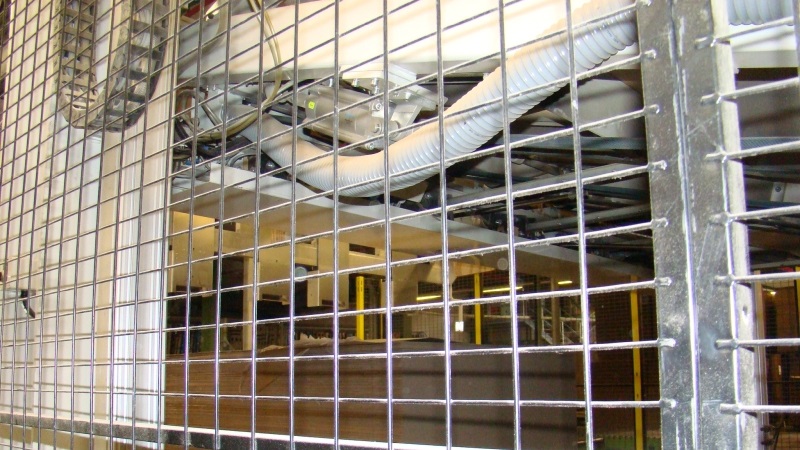
If the used machine does not work as desired after purchase, many technical questions need to be clarified.
In this context, expert opinions on the preservation of evidence in the field of “machinery, mechanical engineering and industrial plants” play a decisive role. These expert opinions serve to document deviations from the contractual agreements and to clarify technical issues. They are often prepared by knowledgeable experts and reviewers who have both in-depth expertise in mechanical engineering and an understanding of the technical and legal constraints.
As a rule, the commissioning of an expert opinion for the preservation of evidence on a machine or industrial plant takes place when the client is of the opinion that the delivered machine or plant does not meet the agreed requirements and thus his expectations have not been fulfilled. These expert opinions are indispensable for gathering objective and fact-based information that can serve as a basis for resolving disputes.
Overall, the preservation of evidence plays an important role in dealing with technical problems in the industry when a defective machine has been delivered and there is a defective delivery. It enables a
factual and professional clarification of contract performance issues and prevents technical disputes from being dragged to the legal level at an early stage without adequate substantiation at the technical level.
Tips to avoid future problems when buying machines
Publicly appointed and EU-certified experts can act in an advisory capacity when purchasing machinery. Experts provide valuable support to ensure that the machine purchase is successful and takes all relevant technical aspects into account.
The risk of a faulty delivery of a machine or even a defective machine is significantly reduced
The expert role in machine purchase includes, for example:
- Appraisal of used machines: The expert can assess the used machine as part of an on-site inspection before purchase and identify potential risks at an early stage.
- Technical advice: An expert can provide technical advice to ensure that the selected machine meets the specific requirements and needs of the buyer. This may include review of technical data sheets, specifications, and design features.
- Valuation and assessment of value: In the case of used machines, the expert can carry out an assessment.
- Technical audits: The expert can review technical agreements between the parties to help ensure that significant technical aspects have been adequately addressed.
- Determination of defects: In the event of defects, the expert can assist in determining the causes.
- Preservation of evidence: In the case of a defective machine or a defective delivery, the experienced expert can prepare a substantiated preservation of evidence report to efficiently get to the heart of the technical problem.
- Arbitrator‘s award: Disputed issues can be resolved very quickly between the customer and supplier in a legally binding manner.
- Conciliation and mediation: In case of disagreement between buyer and supplier/manufacturer, the expert mediator can act as an impartial mediator and bring about an agreement.
Publicly appointed experts in Germany are independent and work without being bound by instructions when it comes to clarifying technical issues in connection with the purchase of machinery or a defective delivery.
Conclusion and final thoughts
Purchasing a used machine requires extensive experience
Significantly higher risk compared to buying a new machine.
When technical errors or defects occur, it is critical for buyers to understand their rights and know the appropriate steps to take to correct the problem.
The first crucial action is to determine the cause of the error or defect. Given the potential
In view of the significant amounts in dispute and the possible effects of business interruptions as a result of faulty machine deliveries, it is advisable to consult an experienced machine expert at an early stage.
This can be done when defining the requirements for purchasing the machine or at the latest when the defective delivery of the machine indicates potential damage.
The challenge arises, particularly with older used machines,
to comply with the industrial safety regulations, which also require the state of the art for old, used industrial machines.
This requirement is often not sufficiently taken into account or, if it is, is almost always underestimated.
Regardless of the specific nature of the problem encountered, associated time and cost issues typically create significant challenges for buyers and operators. Therefore, it is advisable to take a professional approach right from the start. Experts with extensive expertise in mechanical engineering and in legal disputes, especially as court experts, can help to significantly minimize the risks associated with purchasing a machine, although not completely eliminate them.
I recommend that
The purchase of a used industrial machine should be carefully examined and reconsidered.
If there are no significant advantages to purchasing a used machine, purchasing a new machine is almost always associated with a significantly lower risk.

